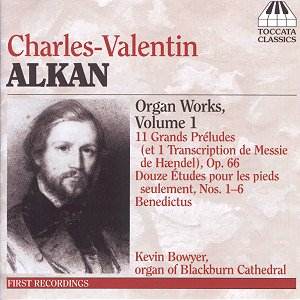Given the competition,
anyone starting a new classical record
label nowadays needs to be both brave
and have a seriously good business strategy.
This is the first disc I have heard
from the recently inaugurated Toccata
Classics, brainchild of Martin Anderson.
The most obvious strategic plank seems
to be unusual repertoire – here bringing
us music that has not previously been
recorded. It will surely be easy enough
to find unrecorded works, the challenge
will be to find unrecorded masterpieces.
In this respect, Alkan’s organ music
is not a bad starting place. Three discs
of it are on their way and, judging
from volume 1, they are works of stature
and originality.
Alkan’s legendary pianism
and improbable compositions for his
instrument are becoming well-recognised
thanks to advocacy from the likes of
Ronald Smith and Marc-André Hamelin.
Busoni ranked him with Liszt, Chopin,
Schumann and Brahms and one of the five
greatest composers for the piano since
Beethoven. By contrast, his prowess
on the organ and compositions for it
have been largely forgotten. In 1834
Alkan won the organ prize at the Paris
Conservatoire. Around this time he became
acquainted with two leading organists
– Louis Lefébure-Wely and César
Franck, and they became the dedicatees
of the Études and Grandes Préludes
respectively, works which were written
much later. This music is less "fantastic"
than Alkan’s major piano works and it
requires less virtuosity but more expressive
sensitivity to play it.
This disc opens with
Benedictus, a work which begins
in surprisingly brooding fashion but
ultimately reaches a magnificent climax.
The six Études which follow represent
the first half of a remarkable set which
makes great demands of the organist’s
feet ... and none from the hands. Here
Alkan was well-ahead of his time. The
Grandes Préludes which conclude
the disc follow an ordered key pattern
descending in thirds. Instead of a twelfth
prelude Alkan concludes the work by
freely transcribing the recitative "Thy
rebuke hath broken his heart" and arioso
"Behold, and see" from the Messiah.
The effect is rather disconcerting –
a bit like an encore which follows attacca
and ends rather abruptly.
Kevin Bowyer is a fine
advocate for this music. He is a leading
British organist whose biggest claim
to fame was the world premiere of Sorabji’s
Organ Symphony – a two hour work which
had lain unplayed for sixty years. Inter
alia he has recorded the complete
organ works of Bach and Alain – I am
only familiar with the latter but can
recommend it highly (a two-disc set
on Nimbus).
My sense is that excellence
in documentation is another strategic
aim for this label and rightly so at
"full price". There is a very detailed
and interesting essay on the music by
Malcolm MacDonald and a likeable note
about the artist. Rather than the usual
overstated eulogy, this seems to have
written in consultation with Kevin Bowyer
and makes him seem like a human being.
For example, we learn that his favourite
pastime is sleeping. Performing Alkan
must be exhausting but at least the
audience isn’t going to sleep through
this music.
The quality of recorded
sound represents my one reservation
about this disc. I do not have any comparative
material from Blackburn Cathedral to
hand and the problems could be mainly
a reflection of the venue. The impression
I had was of an acoustic with too much
resonance, and an instrument too closely
recorded. There is also a persistent
slight audible background hum. I made
some comparisons with some other organ
discs, including Kevin Bowyer’s Alain
recordings and these reinforced my impression
that this sound is not out of the top-drawer.
The sonic reservations are not, however,
sufficiently off-putting to preclude
a strong recommendation for this disc.
Patrick C Waller
